PARIS (AP) — Issa Hayatou, the long-time leader of African soccer who was made interim president of FIFA during its corruption crisis in 2015, died on Thursday. He was 77.
FIFA president Gianni Infantino said in an Instagram post: “Saddened to hear of the passing of former CAF president, former FIFA president and interim, FIFA vice-president and FIFA Council member Issa Hayatou. A passionate sports fan, he dedicated his life to sports administration. On behalf of FIFA, condolences go to his family, friends, former colleagues and all who knew him. Rest in peace.”
Hayatou also was a member of the International Olympic Committee for 15 years, through 2016, and remained an honorary member.
He died in Paris while the city hosted the Olympics.
Though a national champion runner in track and field, it was in soccer that Hayatou rose to power and influence from his native Cameroon.
He was elected to lead the Confederation of African Football in 1988 and within four years was a vice president of the world soccer body FIFA.
In 2002, during a period of deep financial and political turmoil at FIFA, Hayatou challenged then-president Sepp Blatter in an election he would lose heavily despite support for him in Europe. The 139-56 result showed Hayatou had lost votes from his African colleagues.
Blatter still led FIFA in 2015 when federal investigations in the United States and Switzerland of alleged corruption in international soccer swept a generation of leaders from North and South America out of office, and eventually Blatter himself.
Hayatou took over from his one-time rival as an interim president for four months, to steer FIFA toward anti-corruption reforms and an election that put Infantino in office.
In 2017, Hayatou's 29-year reign as the head of CAF was ended in an election he lost to Ahmad Ahmad of Madagascar, who had been supported by Infantino.
Hayatou then faced an investigation by FIFA's ethics committee, and in 2021 was banned from soccer for one year for alleged breach of “duty of loyalty” in a commercial rights deal at CAF.
In a separate case, he was reprimanded by the IOC ethics commission in 2011 for having taken a cash payment from a Swiss marketing agency, ISL, in 1995 when it sold World Cup broadcasting rights for FIFA.
Hayatou was born into a distinguished Cameroon family, and his brother Sadou was prime minister of the national government in 1991-92
AP soccer: https://apnews.com/hub/soccer

FILE - Issa Hayatou, acting FIFA President, speaks during a news conference at FIFA Headquarters in Zurich, Switzerland, Dec. 3, 2015. (Walter Bieri/Keystone via AP, File)
Since childhood, Loveness Bhitoni has collected fruit from the gigantic baobab trees surrounding her homestead in Zimbabwe to add variety to the family’s staple corn and millet diet. The 50-year-old Bhitoni never saw them as a source of cash, until now.
Climate change-induced droughts have decimated her crops. Meanwhile, the world has a growing appetite for the fruit of the drought-resistant baobab as a natural health food.
Bhitoni wakes before dawn to go foraging for baobab fruit, sometimes walking barefoot though hot, thorny landscapes with the risk of wildlife attacks. She gathers sacks of the hard-shelled fruit from the ancient trees and sells them on to industrial food processors or individual buyers from the city.
The baobab trade, which took root in her area in 2018, would previously supplement things like children's school fees and clothing for locals of the small town of Kotwa in northeastern Zimbabwe. Now, it's a matter of survival following the latest devastating drought in southern Africa, worsened by the El Niño weather phenomenon.
“We are only able to buy corn and salt," Bhitoni said after a long day’s harvest. "Cooking oil is a luxury because the money is simply not enough. Sometimes I spend a month without buying a bar of soap. I can’t even talk of school fees or children’s clothes."
The global market for baobab products has spiked, turning rural African areas with an abundance of the trees into source markets. The trees, known for surviving even under severe conditions like drought or fire, need more than 20 years to start producing fruit and aren't cultivated but foraged.
Tens of thousands of rural people like Bhitoni have emerged to feed the need. The African Baobab Alliance, with members across the continent’s baobab producing countries, projects that more than 1 million rural African women could reap economic benefits from the fruit, which remains fresh for long periods because of its thick shell.
The alliance's members train locals on food safety. They also encourage people to collect the fruit, which can grow to 8 inches (20 centimeters) wide and 21 inches (53 centimeters) long, from the ground rather than the hazardous work of climbing the enormous, thick-trunked trees. Many, especially men, still do, however.
Native to the African continent, the baobab is known as the “tree of life” for its resilience and is found from South Africa to Kenya to Sudan and Senegal. Zimbabwe has about 5 million of the trees, according to Zimtrade, a government export agency.
But the baobab's health benefits long went unnoticed elsewhere.
Gus Le Breton, a pioneer of the industry, remembers the early days.
“Baobab did not develop into a globally traded and known superfood by accident,” said Le Breton, recalling years of regulatory, safety and toxicology testing to convince authorities in the European Union and United States to approve it.
“It was ridiculous because the baobab fruit has been consumed in Africa safely for thousands and thousands of years,” said Le Breton, an ethnobotanist specializing in African plants used for food and medicine.
Studies have shown that the baobab fruit has several health benefits as an antioxidant, and a source of vitamin C and essential minerals such as zinc, potassium and magnesium.
The U.S. legalized the import of baobab powder as a food and beverage ingredient in 2009, a year after the EU. But getting foreign taste buds to accept the sharp, tart-like taste took repeated trips to Western and Asian countries.
“No one had ever heard of it, they didn’t know how to pronounce its name. It took us a long time,” Le Breton said. The tree is pronounced BAY-uh-bab.
Together with China, the U.S. and Europe now account for baobab powder's biggest markets. The Dutch government's Center for the Promotion of Imports says the global market could reach $10 billion by 2027. Le Breton says his association projects a 200% growth in global demand between 2025 and 2030, and is also looking at increasing consumption among Africa’s increasingly health-conscious urbanites.
Companies such as Coca-Cola and Pepsi have opened product lines promoting baobab ingredients. In Europe, the powder is hyped by some as having “real star qualities” and is used to flavor beverages, cereals, yogurt, snack bars and other items.
A packet of a kilogram (2.2 pound) of baobab powder sells for around 27 euros (about $30) in Germany. In the United Kingdom, a 100-milliliter (3.38-ounce) bottle of baobab beauty oil can fetch 25 pounds (about $33).
The growing industry is on display at a processing plant in Zimbabwe, where baobab pulp is bagged separately from the seeds. Each bag has a tag tracing it to the harvester who sold it. Outside the factory, the hard shells are turned into biochar, an ash given to farmers for free to make organic compost.
Harvesters like Bhitoni say they can only dream of affording the commercial products the fruit becomes. She earns 17 cents for every kilogram of the fruit and she can spend up to eight hours a day walking through the sunbaked savanna. She has exhausted the trees nearby.
“The fruit is in demand, but the trees did not produce much this year, so sometimes I return without filling up a single sack," Bhitoni said. "I need five sacks to get enough money to buy a 10-kilogram (22-pound) packet of cornmeal.”
Some individual buyers who feed a growing market for the powder in Zimbabwe's urban areas prey on residents' drought-induced hunger, offering cornmeal in exchange for seven 20-liter (around 4-gallon) buckets of cracked fruit, she said.
“People have no choice because they have nothing,” said Kingstone Shero, the local councilor. “The buyers are imposing prices on us and we don’t have the capacity to resist because of hunger.”
Le Breton sees better prices ahead as the market expands.
“I think that the market has grown significantly, (but) I don’t think it has grown exponentially. It’s been fairly steady growth," he said. "I believe at some point that it will increase in value as well. And at that point, then I think that the harvesters will really start to be earning some serious income from the harvesting and sale of this really truly remarkable fruit.”.
Zimtrade, the government export agency, has lamented the low prices paid to baobab pickers and says it's looking at partnering with rural women to set up processing plants.
The difficult situation is likely to continue due to a lack of negotiating power by fruit pickers, some of them children, said Prosper Chitambara, a development economist based in Zimbabwe’s capital, Harare.
On a recent day, Bhitoni walked from one baobab tree to the next. She carefully examined each fruit before leaving the smaller ones for wild animals such as baboons and elephants to eat — an age-old tradition.
“It is tough work, but the buyers don’t even understand this when we ask them to increase prices,” she said.
For more news on Africa and development: https://apnews.com/hub/africa-pulse
The Associated Press receives financial support for global health and development coverage in Africa from the Gates Foundation. The AP is solely responsible for all content. Find AP’s standards for working with philanthropies, a list of supporters and funded coverage areas at AP.org.
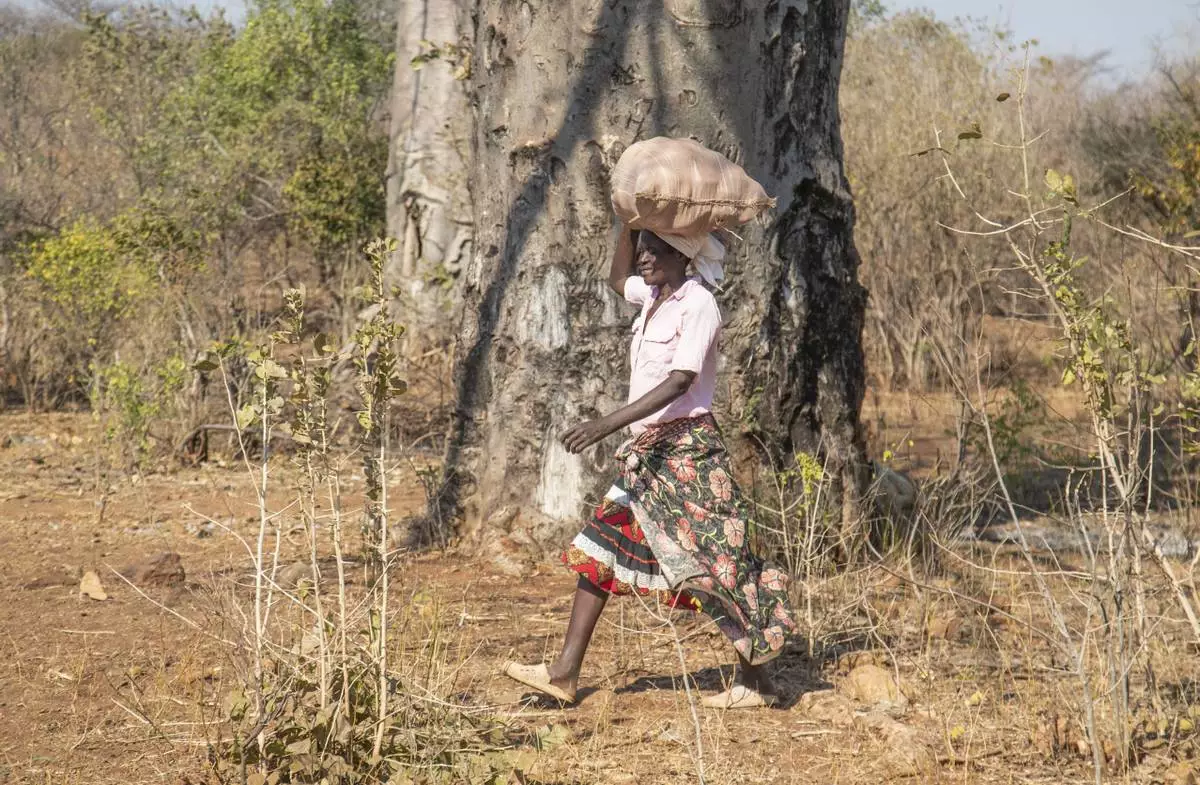
Loveness Bhitoni carries baobab fruits from a tree, in Mudzi, Zimbabwe, Thursday, Aug. 22, 2024. (AP Photo/Aaron Ufumeli)
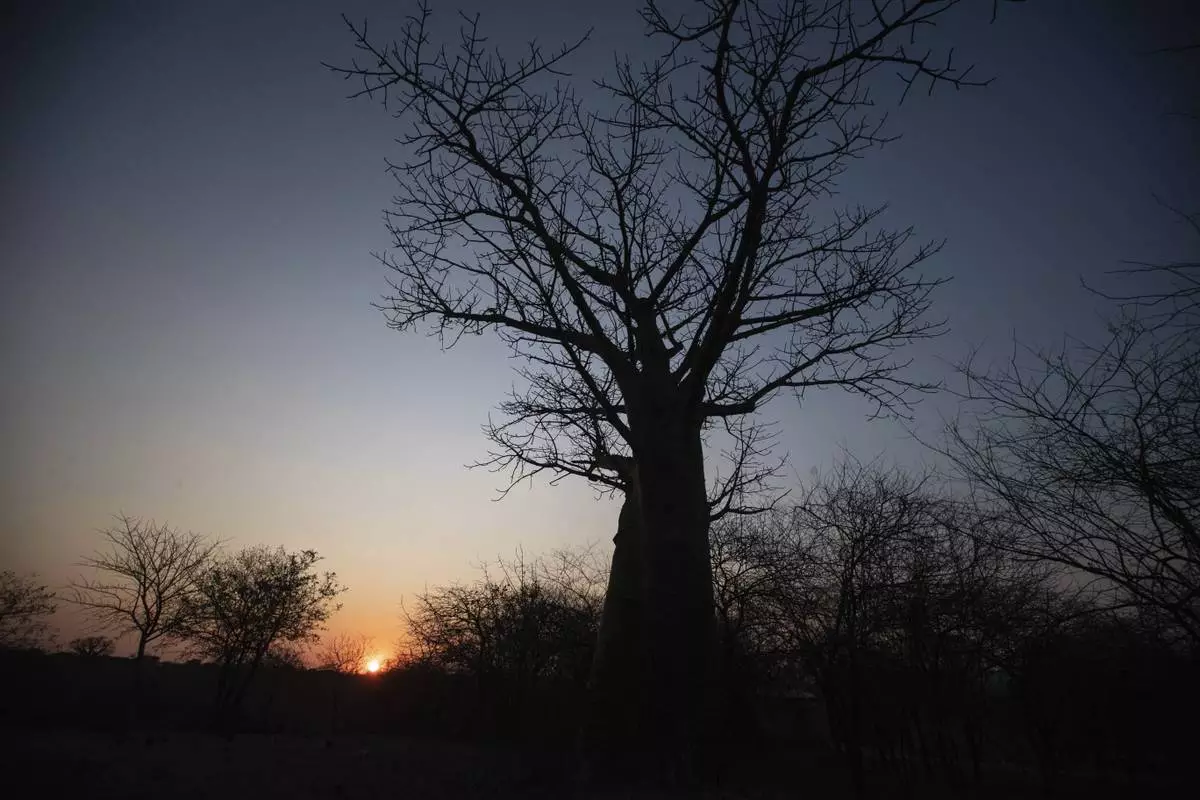
The sun sets behind a baobab tree, known as the tree of life, in Mudzi, Zimbabwe, Thursday, Aug. 22, 2024. (AP Photo/Aaron Ufumeli)
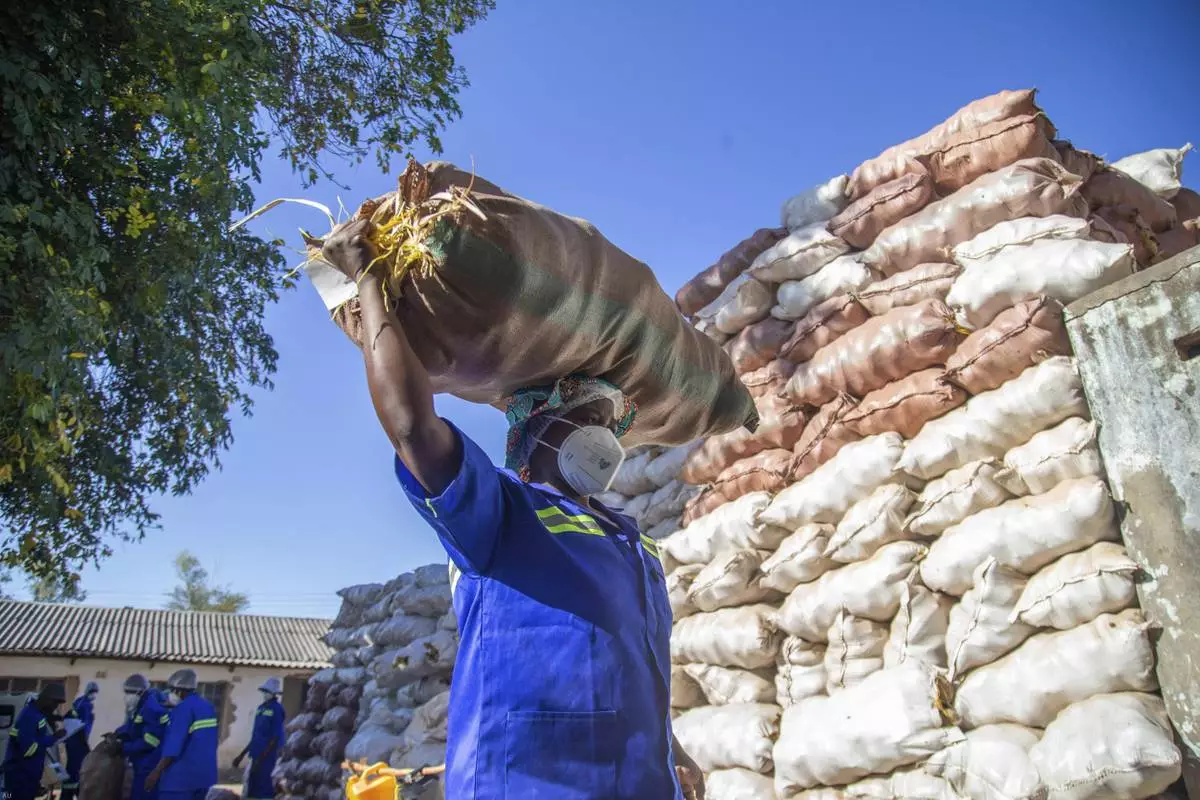
Workers at a baobab factory carry a sack full of baobab fruits for processing in Mudzi, Friday, Aug. 23 ,2024. (AP Photo/Aaron Ufumeli)
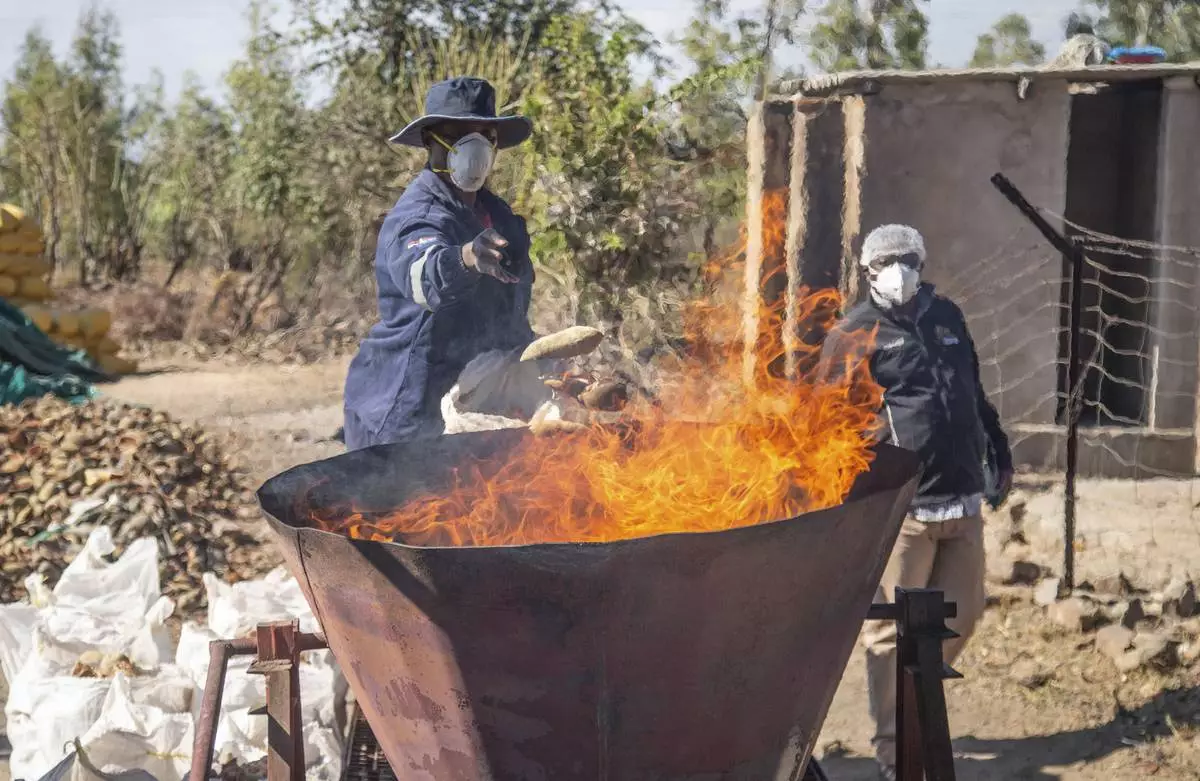
A worker trows shells of baobab fruits into a furnace for the purposes of manure at an baobab factory in Mudzi, Zimbabwe, Friday, Aug. 23, 2024. (AP Photo/Aaron Ufumeli)
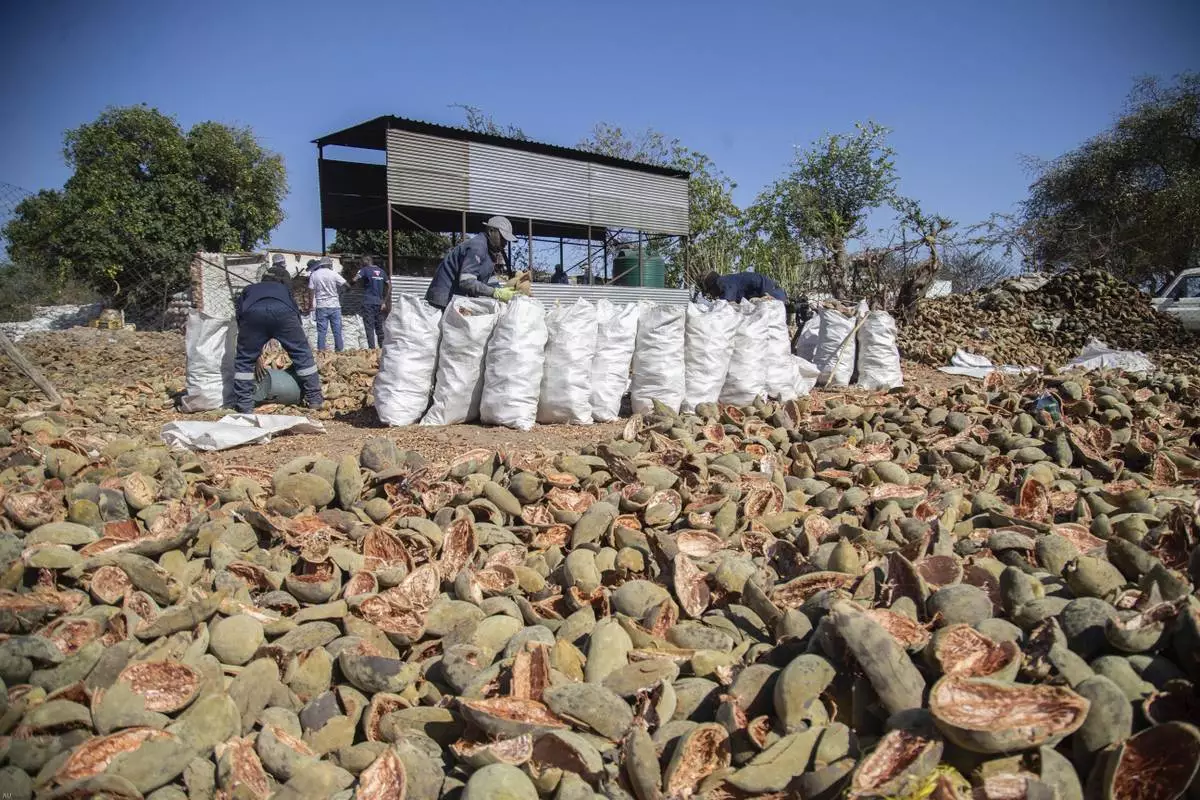
Workers load shells of the baobab fruits to be burnt and used as manure at a baobab factory in Mudzi, Zimbabwe, Friday, Aug. 23 ,2024. (AP Photo/Aaron Ufumeli)
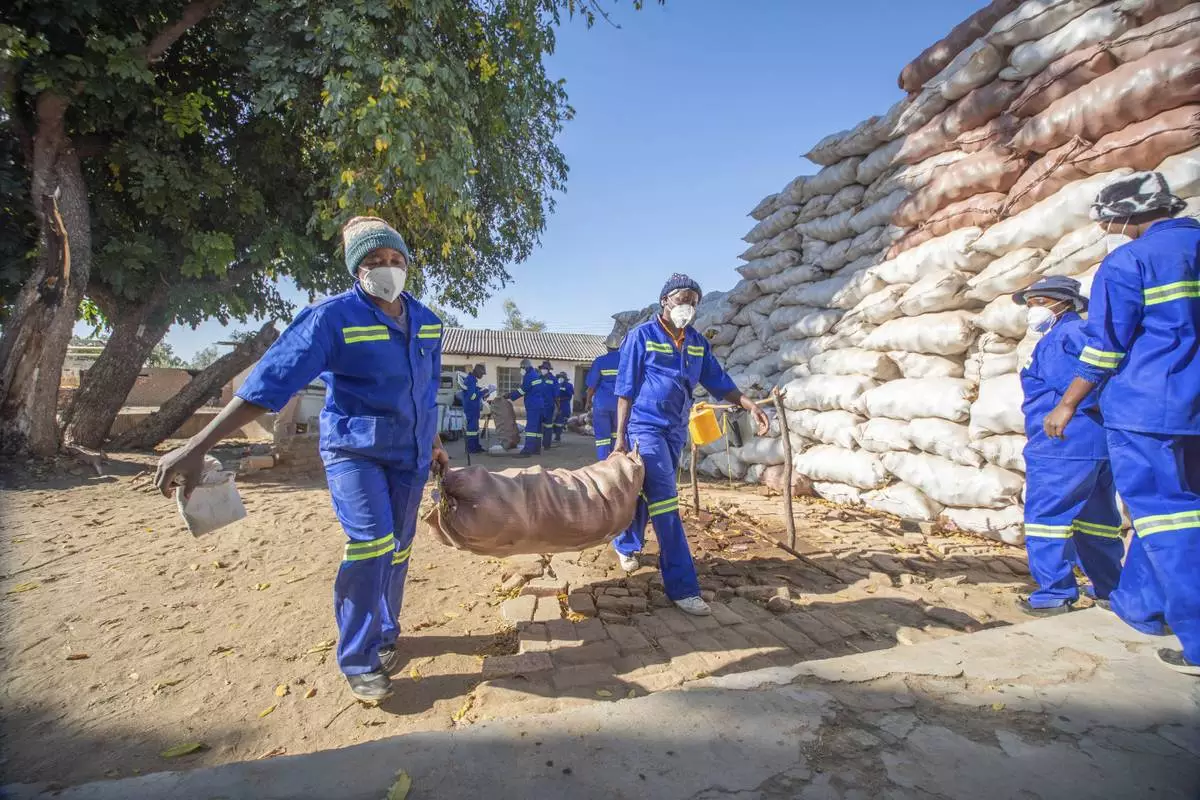
Workers at a baobab factory carry a sack full of baobab fruits for processing in Mudzi, Friday, Aug. 23 ,2024. (AP Photo/Aaron Ufumeli)
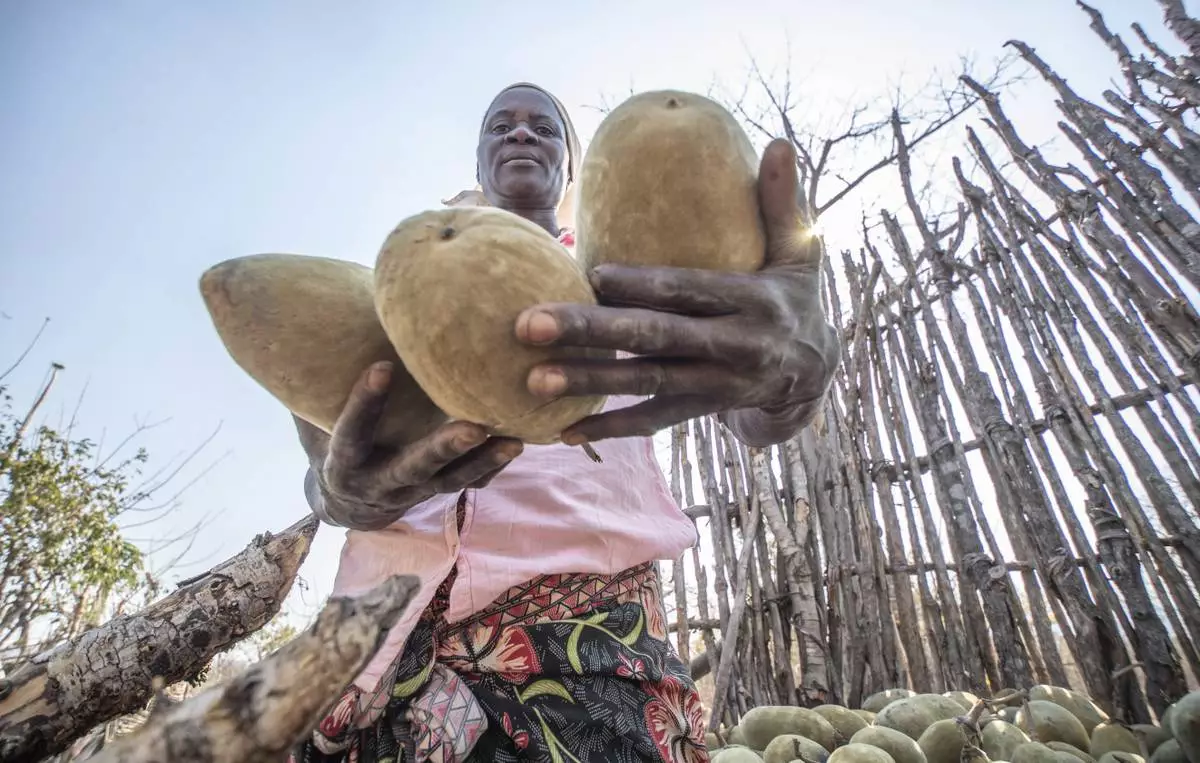
Loveness Bhitoni harvests fallen baobab fruit in Mudzi, Zimbabwe, Thursday,Aug. 22, 2024. (AP Photo/Aaron Ufumeli)
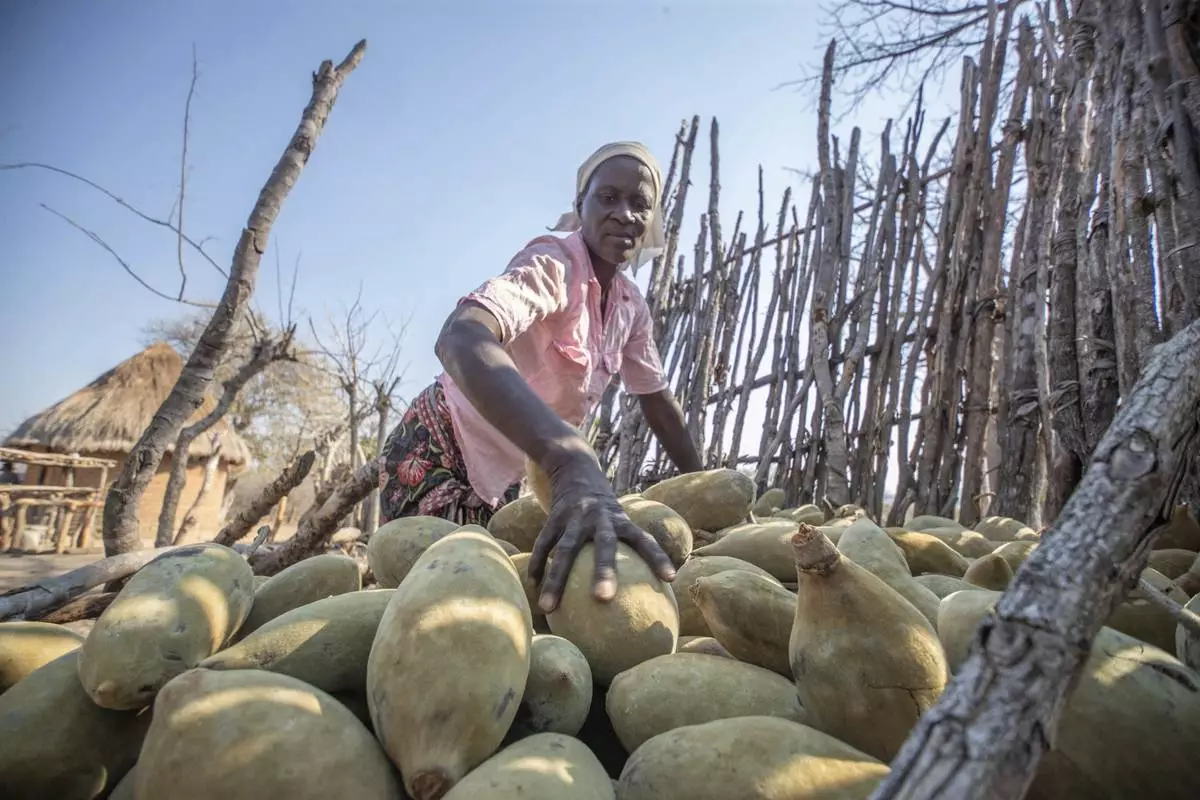
Loveness Bhitoni harvests fallen baobab fruit in Mudzi, Zimbabwe, Thursday,Aug. 22, 2024. (AP Photo/Aaron Ufumeli)
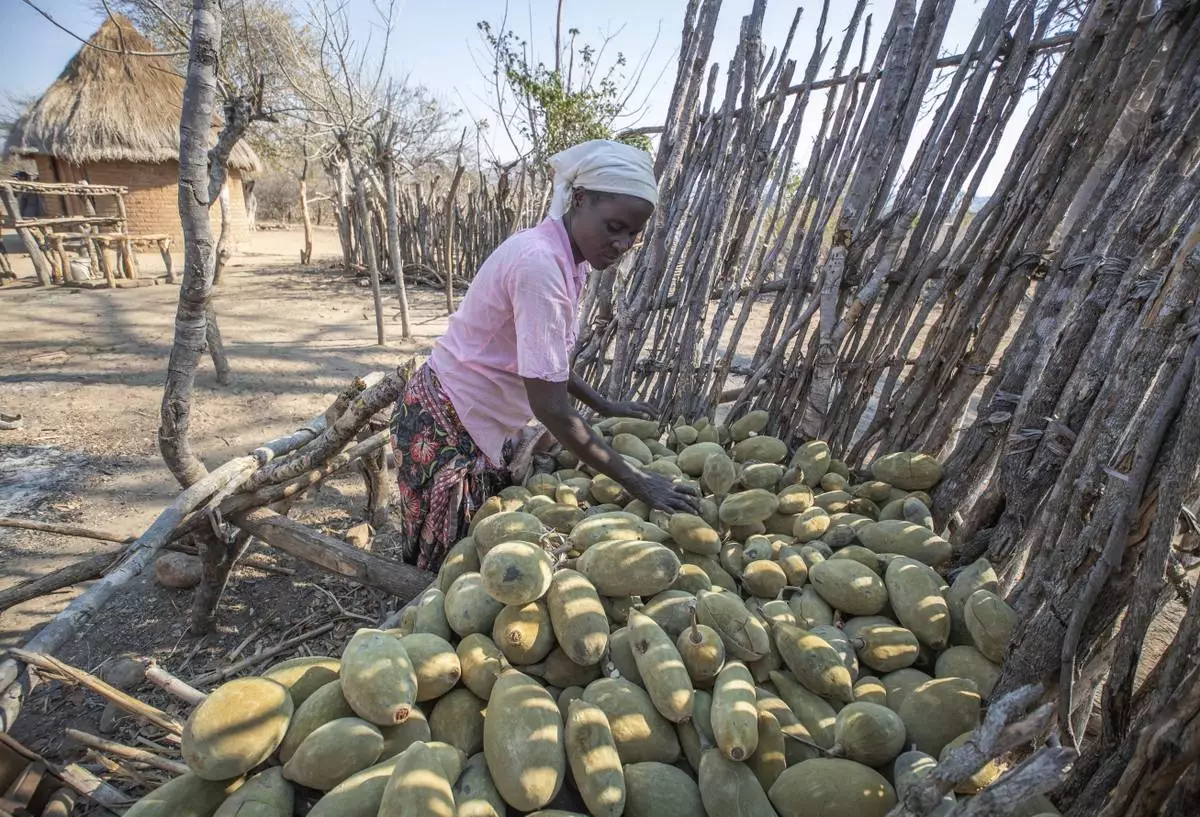
Loveness Bhitoni harvests fallen baobab fruit in Mudzi, Zimbabwe, Thursday,Aug. 22, 2024. (AP Photo/Aaron Ufumeli)
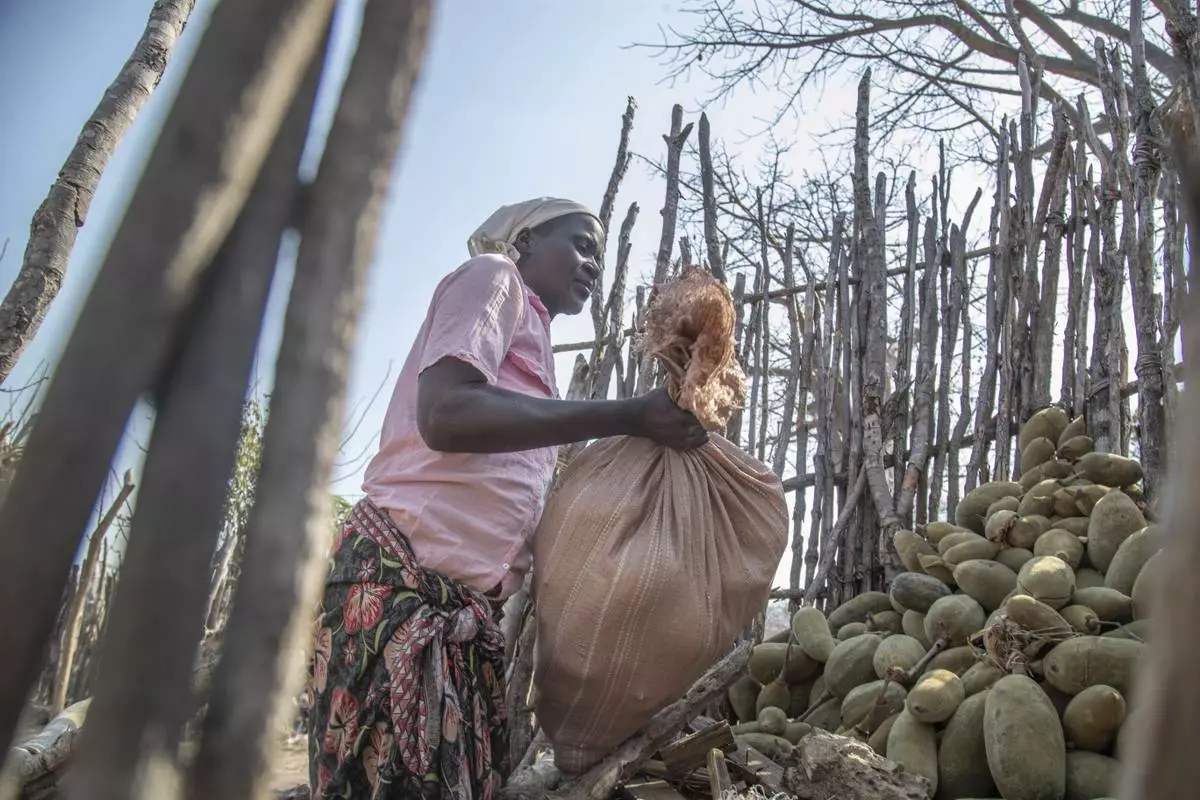
Loveness Bhitoni harvests fallen baobab fruit under in Mudzi, Zimbabwe, Thursday,Aug. 22, 2024. (AP Photo/Aaron Ufumeli)
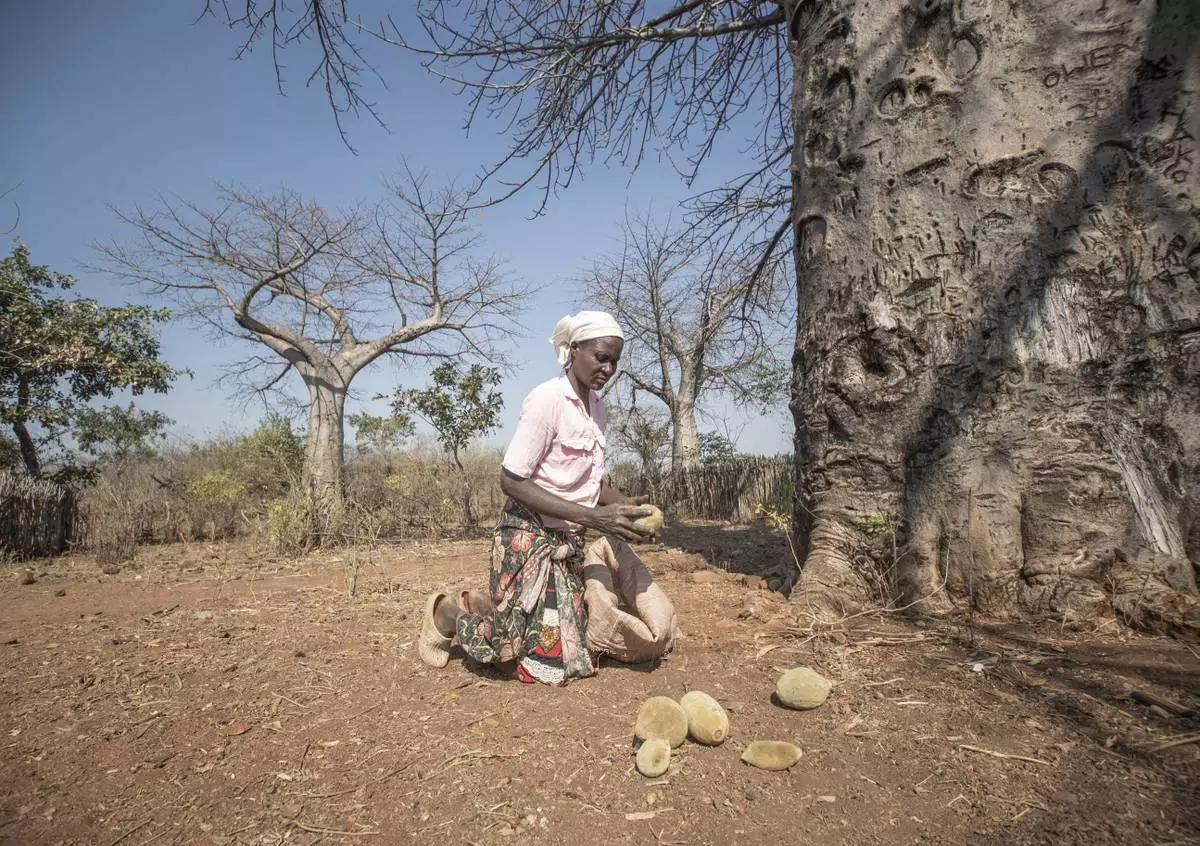
Loveness Bhitoni picks up fallen baobab fruit under a baobab tree in Mudzi, Zimbabwe, Thursday,Aug. 22, 2024. (AP Photo/Aaron Ufumeli)





















